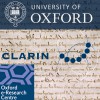Oral History Collections
Presentation from Stef Scagliola of Erasmus University Rotterdam at the event "Exploring Spoken Word Data in Oral History Archives", held at the e-Research Centre, University of Oxford, on 18-19 April 2016, organized by Martin Wynne as part of the CLARIN-PLUS project (http://www.clarin.eu).
Elicited personal spoken narratives have a physical dimension - pressure waves traveling through the air between two speakers - and a semantic dimension - memories and self representations that are woven into a co-created story. The story can be suited for scholarly use or reuse and for a variety of purposes. It may contain references to facts that are omitted from written sources, it can shed light on coping mechanisms to overcome adversity, but it can also offer insights in the structure of dialogue, the relation between vocal and facial expression and gender-related aspects of language use.
Progress in digital technology has transformed the oral history landscape. Before the ‘digital revolution’, the only viable way to access and analyse this type of data was through its textual representation: printed catalogues and transcripts. Nowadays, a considerable number of the vast array of oral history collections that have been created worldwide since the introduction of cheap recording technology in the 1960’s, is available online. Individual researchers are increasingly encouraged to deposit their interviews after completion of their research, so that other scholars can reuse them. This has yielded a huge potential of useful data for multiple academic audiences.
The question is how digital tools created to support humanities research in general, can be tailored to extract the characteristic features of personal narratives in ways that match specific methodologies of diverse disciplines. In other words, how can innovation in computer science support the exploitation of this multilayered type of data and bring about innovation in cross-disciplinary scholarly research? Search technology has provided new frameworks that facilitates interaction with the data at various semantic levels. Progress can also be observed with regard to manual annotation tools. But when it comes to the next stage of the research process, the analysis of data, the bottle neck for wide-scale reuse of oral history remains the lack of transcripts, because of the dependency on the labour-intensive process of manual transcription. How to set the agenda for collaboration between developers and the various scholarly communities that want to use oral history material as research data?




